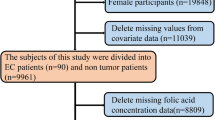Abstract
Purpose
The value of testing for folate deficiency has been scrutinized recently given low prevalence of deficiency with widespread dietary fortification. Numerous studies have shown folate testing to be low yield overall. However, the value of such testing in the inpatient cancer population has not been defined.
Methods
We queried all folate tests performed during 2017 at our center on admitted cancer patients. We used diagnosis codes and manual chart review to assess risk factors for folate deficiency. Descriptive statistics were used to summarize characteristics of patients undergoing folate testing, the frequency of vitamin B12 co-testing, and repeat folate testing. Fisher’s exact test was used to compare the proportion of deficient vs. not deficient tests based on the presence of risk factors. A Cox proportional hazards model was fit to examine the association between folate deficiency and survival.
Results
In total, 937 patients had 1065 tests performed during 2017. Among all tests, 7.0% indicated folate deficiency. In patients who underwent two folate tests in a single hospitalization, 89% were deficient neither instance. Risk factors for folate deficiency were equally common in instances with deficient compared with replete testing (25.3 vs. 20.4%, P = 0.334). Folate deficiency was associated with higher risk for death (HR 1.49, 95% CI 1.10–2.03, P = 0.01).
Conclusion
Folate deficiency was present in 7% of hospitalized cancer patients and associated with shorter overall survival. Repeat testing in the same patient over time was low yield. Traditional risk factors for folate deficiency do not appear to apply in this patient population.

Similar content being viewed by others
References
Theisen-Toupal J, Horowitz GL, Breu AC (2013) Utility, charge, and cost of inpatient and emergency department serum folate testing. J Hosp Med 8(2):91–95
Shojania AM, von Kuster K (2010) Ordering folate assays is no longer justified for investigation of anemias, in folic acid fortified countries. BMC research notes 3(1):22
Folate Testing: A Review of the Diagnostic Accuracy, Clinical Utility, Cost-Effectiveness and Guidelines (2015). In: CADTH rapid response reports, vol July. Canadian Agency for Drugs and Technologies in Health Copyright (c) 2015 Canadian Agency for Drugs and Technologies in Health., Ottawa (ON),
American Society for Clinical Pathology - Blood folate levels | Choosing Wisely. https://www.choosingwisely.org/clinician-lists/ascp-do-not-order-red-blood-cell-folate-levels/. Accessed November 6 2019
Green R, Mitra AD (2017) Megaloblastic anemias: nutritional and other causes. Med Clin 101(2):297–317
WHO | Serum and red blood cell folate concentrations for assessing folate status in populations. https://www.who.int/nutrition/publications/micronutrients/indicators_serum_RBC_folate/en/. Accessed November 6 2019
Gudgeon P, Cavalcanti R (2015) Folate testing in hospital inpatients. Am J Med 128(1):56–59
Byström P, Björkegren K, Larsson A, Johansson L, Berglund Å (2009) Serum vitamin B12 and folate status among patients with chemotherapy treatment for advanced colorectal cancer. Ups J Med Sci 114(3):160–164
Funding
Dr. Korenstein’s work was supported in part by Cancer Center Support Grant P30 CA008748 to Memorial Sloan Kettering Cancer Center from the National Cancer Institute.
Author information
Authors and Affiliations
Corresponding author
Ethics declarations
Ethical approval
All procedures performed in studies involving human participants were in accordance with the ethical standards of the institutional and/or national research committee (include name of committee + reference number) and with the 1964 Helsinki Declaration and its later amendments or comparable ethical standards. The authors have collectively held full control over the primary data. They agree to journal review if so requested.
Conflict of interest
Spouse of author DK is on the scientific advisory board of Vedanta Pharmaceuticals and performs consulting work for Takeda Pharmaceuticals. There are no other conflicts to report.
Additional information
Publisher’s note
Springer Nature remains neutral with regard to jurisdictional claims in published maps and institutional affiliations.
Rights and permissions
About this article
Cite this article
Epstein-Peterson, Z.D., Li, D.G., Lavery, J.A. et al. Inpatient folate testing at an academic cancer center: single-year experience. Support Care Cancer 28, 4235–4240 (2020). https://doi.org/10.1007/s00520-019-05267-1
Received:
Accepted:
Published:
Issue Date:
DOI: https://doi.org/10.1007/s00520-019-05267-1



